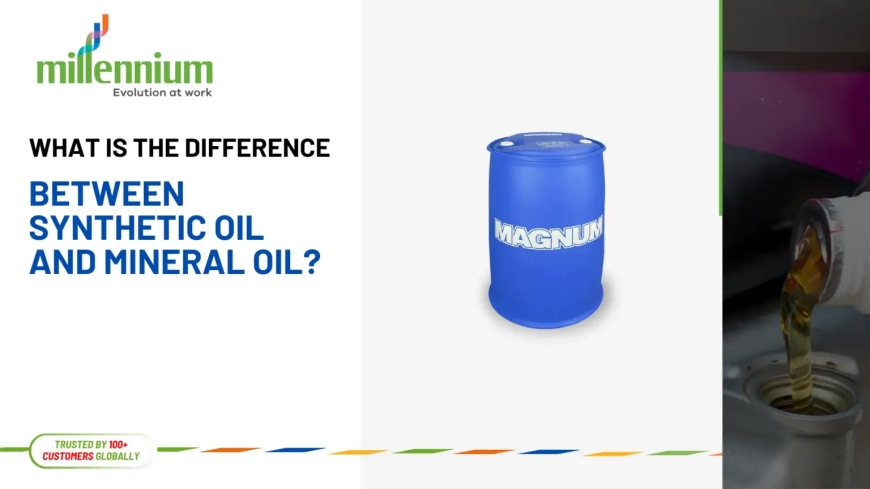What is the Difference Between Synthetic Oil and Mineral Oil?
The choice between synthetic and mineral oil has a direct impact on engine health, longevity, and performance.

Engine oil plays a crucial role in maintaining engine health, reducing friction, and enhancing performance. With several options available on the market, two primary categories dominatesynthetic oil vs mineral oil. Understanding the differences between these two types of oils is essential for making the right choice for your engines needs. This article explores what synthetic and mineral oils are, how theyre made, their types, and how they compare in performance.
What is Synthetic Oil?
Synthetic oil is a man-made lubricant engineered from chemically modified base oils. Unlike conventional oils that are refined directly from crude oil, synthetic oils are designed to provide superior performance in extreme temperatures, heavy loads, and high-stress conditions. These oils are formulated to reduce wear, resist breakdown, and flow smoothly regardless of the operating environment.
Synthetic oils are favored for their uniform molecular structure, which ensures consistent performance and better protection. They are particularly useful in high-performance engines and in modern vehicles requiring extended drain intervals or operating under harsh driving conditions.
How is Synthetic Oil Made?
Synthetic oil is produced through a complex process involving chemical synthesis and refining. The base stock is created using high-quality hydrocarbon molecules, often derived from natural gas or other raw materials. These molecules are then modified through processes such as polymerization, hydrocracking, and esterification to achieve the desired viscosity, thermal stability, and lubricity.
Additives are blended into the base oil to enhance properties such as oxidation resistance, anti-wear protection, and cleaning ability. This meticulous design process allows synthetic oils to outperform conventional oils in most aspects of engine protection.
Types of Synthetic Oil
-
Full Synthetic Oil
Made entirely from chemically engineered base oils and advanced additives, full synthetics offer the highest level of performance and protection. -
Synthetic Blend (Semi-Synthetic) Oil
A mix of synthetic and mineral oil, synthetic blends provide some benefits of full synthetics at a lower price point. They are often used in mid-range vehicles or by drivers seeking better protection without the full cost. -
Ester-Based Synthetic Oil
Often used in high-performance and aviation engines, these oils are derived from esters, which offer excellent lubrication and thermal stability.
What is Mineral Oil?
Mineral oil, also known as conventional oil, is derived directly from refined crude oil. It undergoes less processing than synthetic oil and contains a broader range of naturally occurring hydrocarbons. While adequate for many older engines and less demanding applications, mineral oil does not provide the same level of consistency or longevity as synthetic options.
Mineral oils are more prone to breakdown at high temperatures and may leave behind deposits over time. However, they remain a cost-effective solution for vehicles with simple lubrication needs and short maintenance intervals.
How is Mineral Oil Made?
Mineral oil is produced through the refining of crude oil. The process involves removing contaminants such as sulfur and wax while isolating the lubricant fractions of the petroleum. This is followed by hydro-treating and solvent refining to improve stability and performance.
Despite these refinements, mineral oil still contains molecular inconsistencies and impurities that can lead to oxidation and sludge buildup over time, especially in high-heat or high-load conditions.
Types of Mineral Oil
-
Paraffinic Oil
Known for its high viscosity index and stability, paraffinic oil is suitable for engine lubrication and industrial applications. -
Naphthenic Oil
Offers good low-temperature performance but has a lower viscosity index and thermal stability compared to paraffinic oils. -
Aromatic Oil
Rarely used as a base oil for lubricants due to poor stability but may be used in small amounts in additive formulations.
Key Differences Between Synthetic and Mineral Oil
| Feature | Synthetic Oil | Mineral Oil |
|---|---|---|
| Source | Chemically engineered | Refined crude oil |
| Molecular Structure | Uniform and consistent | Irregular, with impurities |
| Oxidation Resistance | High | Moderate to low |
| Temperature Stability | Performs well in high/low temps | Degrades faster in extreme temps |
| Wear Protection | Superior | Adequate for basic needs |
| Engine Cleanliness | Keeps engine cleaner | More prone to sludge formation |
| Price | More expensive | More affordable |
| Drain Intervals | Longer | Shorter |
Which Oil is Better for Your Engine?
Choosing between synthetic and mineral oil depends on your engine type, usage patterns, and maintenance budget.
-
Synthetic oil is the preferred choice for:
-
High-performance or turbocharged engines
-
Extreme temperature environments
-
Long-distance driving and extended oil change intervals
-
Drivers seeking maximum engine protection and fuel efficiency
-
-
Mineral oil is suitable for:
-
Older vehicles not requiring high-spec lubricants
-
Short-trip or city driving under mild conditions
-
Budget-conscious users with frequent maintenance schedules
-
If your vehicles manufacturer recommends synthetic oil, its best not to substitute it with mineral oil. However, synthetic blends can serve as a middle ground, offering better protection than mineral oil at a more affordable price than full synthetics.
Conclusion
The choice between synthetic and mineral oil has a direct impact on engine health, longevity, and performance. While synthetic oils offer superior protection, efficiency, and durability, mineral oils provide basic lubrication at a lower cost. Understanding your vehicles needs and operating conditions is key to selecting the right oil type. Whether you're a daily commuter, a performance enthusiast, or an industrial user, choosing the right engine oil ensures your engine runs smoothly for years to come.




































